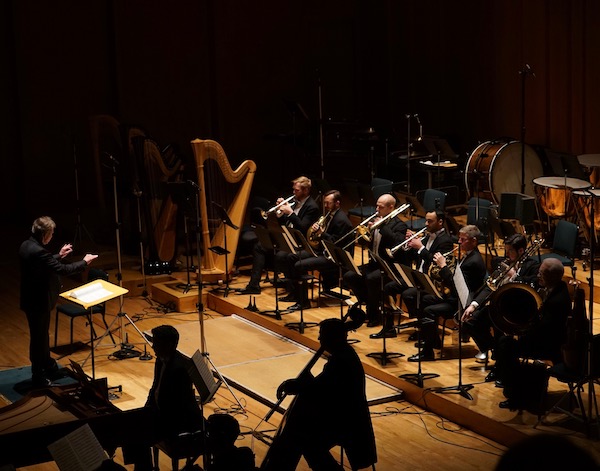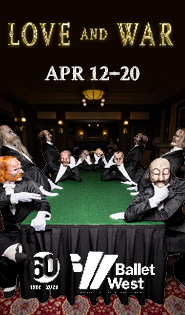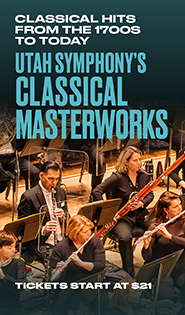Fischer leads the Utah Symphony in whirling and powerful Berlioz

Thierry Fischer conducted the Utah Symphony brass in Pierre Boulez’s “Initial” on the first half of Friday night’s concert at Abravanel Hall. Photo: Kathleen Sykes
Hector Berlioz’s Symphonie fantastique is a work closely associated with Thierry Fischer. It was his audition piece when the Utah Symphony was looking for a music director to replace Keith Lockhart, and in the decade since, Fischer has conducted it a number of times.
The work is on the program again this weekend, and for these performances Abravanel Hall is transformed into a recording studio, with this weekend’s performances to appear on an all-Berlioz album for Hyperion.
That Symphonie fantastique is one of Fischer’s signature works was evident Friday evening. Conducting without a score, Fischer looked confident and was convincing in his interpretation. His current account was powerful, capturing the scope and depth of the work without ever overplaying it, and allowing the vibrant instrumental colors to shine.
If one came to the concert expecting a new, revelatory interpretation of what unquestionably is one of Berlioz’s masterpieces, one may have been disappointed. Fischer didn’t break any new ground with his reading. Rather, Fischer let the music speak for itself, as any good conductor should, and guided it with a vision of its essence that he communicated decisively to his players.
The Largo that opens the first movement featured some beautifully lyrical string playing before the arrival of a more robust Allegro agitato section. Fischer captured the dynamics of the music and kept things well balanced throughout the stark contrasts that Berlioz created in this movement. His was a cohesive and well thought out account.
Fischer has a penchant for brisk tempos in allegro movements, but he made the most of the lively rhythms of the second movement ball with a rather restrained but effective pace. The music fairly swirled with exuberance and excitement.
The third movement opens with a dreamy duet for English horn and off-stage oboe, and Lissa Stolz (English horn) and James Hall (oboe) played it with expressive and well-crafted phrasings. And expression was the key element in this movement, with Fischer eliciting nuanced playing with subtle inflections in delivery and dynamics from his ensemble.
The “March to the Scaffold” that followed was boldly projected, and Fischer reveled in the dramatics of the music. His reading here was decisive, compelling and somewhat brash but never over-the-top.
The maestro created an atmospheric, almost eerie, mood in the opening of the finale that kept building to a demonic climax. In the impassioned playing that he coaxed from the orchestra, he created a powerful moment that brought the entire work to a stormy and mighty finish.
The first half of the concert made for a strong contrast to Berlioz, who was counterprogrammed with the last two of J.S. Bach’s Brandenburg Concertos, which in turn bookended a short piece by Pierre Boulez.
Boulez’s Initial, scored for brass, is a fanfare-like piece that features virtuoso writing and relentless drive and intensity. The brass players acquitted themselves spectacularly in this demanding piece, bringing cohesiveness to the disparate and fragmented motives that bounce around each of the instruments.
Both the Fifth and Sixth Brandenburg Concertos were played without a conductor.
The Fifth featured guest harpsichordist Jeannette Sorrell, founder and music director of Apollo’s Fire, one of this country’s premiere period instrument ensembles. She gave a seamlessly lyrical and expressive reading of the extended harpsichord solo in the first movement. And throughout the the three movements, she was careful to make sure she and the other two soloists blended effortlessly.
That care was strikingly evident in the slow movement, scored just for the three soloists. She and violinist Kathryn Eberle and flutist Mercedes Smith played this movement with a refined sense of expression and beautifully crafted phrasings.
The Sixth featured the Utah Symphony’s associate principal viola, Roberta Zalkind, in her swan song performance, as she officially retires from the orchestra after this weekend. She was joined by principal viola Brant Bayless, and the two gave a wonderfully fluid reading, ably supported by three cellos, contrabass and harpsichord (played by Jason Hardink). The seven players captured the dark mellowness of the music and played with finely honed expression and an exuberance that underscored the rhythmic lilt of the music.
The program will be repeated 7:30 p.m. Saturday in Abravanel Hall. utahsymphony.org; 801-355-2787.

